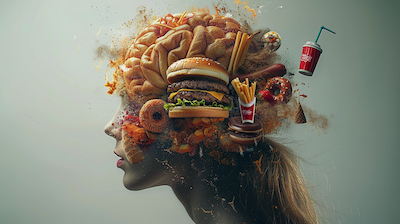What Highly Processed Food is Doing to Your Brain
While unprocessed foods nourish your brain, highly processed foods can have concerning effects on brain health. Understanding these impacts can help you make informed dietary choices.
How Processed Foods Affect Your Brain
1. Inflammation and Brain Function
- Triggers neuroinflammation
- Disrupts neural communication
- May damage brain tissue
- Affects memory formation
2. Blood Sugar and Cognitive Function
- Creates energy spikes and crashes
- Impairs concentration
- Affects decision-making ability
- May lead to brain fog
3. Mood and Mental Health
- Disrupts neurotransmitter balance
- May increase anxiety
- Can affect depression risk
- Impacts emotional regulation
Most Problematic Ingredients
Artificial Additives
- Artificial sweeteners
- Chemical preservatives
- Synthetic colors
- Flavor enhancers
Refined Carbohydrates
- White flour products
- Added sugars
- High fructose corn syrup
- Modified starches
Short-Term Brain Effects
Immediate impacts include:
- Reduced mental clarity
- Difficulty concentrating
- Memory lapses
- Mood swings
- Energy fluctuations
- Increased food cravings
Long-Term Consequences
Regular consumption may lead to:
- Accelerated cognitive decline
- Increased inflammation
- Compromised brain structure
- Higher risk of mental health issues
- Potential memory problems
The Brain-Gut Connection
Processed foods can disrupt the gut-brain axis by:
- Altering gut bacteria composition
- Disrupting neurotransmitter production
- Increasing intestinal permeability
- Affecting nutrient absorption
Hidden Sources of Processed Foods
Watch out for these seemingly healthy items:
- Flavored yogurts
- Granola bars
- Breakfast cereals
- Packaged snacks
- Ready-made sauces
- Diet drinks
Signs Your Brain is Affected
Common indicators include:
- Poor concentration
- Frequent headaches
- Unstable mood
- Memory issues
- Brain fog
- Anxiety or depression
Supporting Brain Health
Take these steps to protect your brain:
- Read ingredient labels carefully
- Choose whole food alternatives
- Cook meals from scratch
- Plan healthy snacks
- Stay hydrated with water
Research Methods
This article is based on:
- Neuroscience research studies
- Clinical nutrition data
- Cognitive health research
- Brain imaging studies
Common Questions About Processed Foods and Brain Health
Q1: How quickly does processed food affect the brain?
Some effects, like blood sugar spikes and energy crashes, can occur within hours of consuming highly processed foods. Mental fog and mood changes may be noticeable within days of regular consumption.
More serious impacts on brain structure and function typically develop over months or years of consistent processed food intake.
Q2: Can the brain recover from processed food damage?
Yes, the brain shows remarkable plasticity and ability to heal. Many people report improved mental clarity, focus, and mood within weeks of reducing processed food intake. For inspiration, check out how unprocessed foods can benefit your brain.
Q3: Are all processed foods equally harmful to brain health?
No, the level of processing matters significantly. Minimally processed foods (like frozen vegetables or canned legumes) have little negative impact. Ultra-processed foods with multiple artificial additives, refined sugars, and unhealthy fats pose the greatest risks to brain health.
Q4: Do artificial sweeteners affect brain function?
Research suggests artificial sweeteners may impact brain function by altering gut bacteria, affecting neurotransmitter production, and potentially disrupting glucose metabolism. Some studies indicate they might increase sugar cravings and affect appetite regulation in the brain.
Q5: What's the connection between processed foods and mental health?
Processed foods can affect mental health through multiple mechanisms: disrupting neurotransmitter balance, increasing inflammation, affecting gut bacteria composition, and destabilizing blood sugar levels. These changes may contribute to anxiety, depression, and mood swings.
Practical Steps to Protect Your Brain
Kitchen Makeover
- Audit your pantry for ultra-processed foods
- Replace processed snacks with whole food options
- Stock up on brain-healthy alternatives
- Organize your kitchen to make healthy choices easier
- Keep processed foods out of sight or out of home
Shopping Strategies
- Shop with a prepared list
- Read nutrition labels carefully
- Avoid shopping when hungry
- Focus on whole, single-ingredient foods
- Choose foods with minimal ingredients
Meal Planning Tips
- Prepare meals in advance
- Keep healthy snacks readily available
- Plan for busy days
- Batch cook brain-healthy meals
- Include a variety of whole foods
Latest Research on Processed Foods and Brain Health
Recent scientific findings reveal concerning connections:
- Brain imaging studies show structural changes associated with high processed food consumption
- Research links ultra-processed foods to accelerated cognitive decline
- Studies indicate impacts on memory and learning capabilities
- New evidence suggests effects on brain inflammation and oxidative stress
Key research institutions investigating these connections:
- National Institutes of Health
- Harvard Medical School
- Max Planck Institute for Metabolism Research
- Brain and Mind Centre, University of Sydney
Healthy Alternatives to Common Processed Foods
Instead of Sugary Snacks:
- Fresh fruit with nuts
- Homemade trail mix
- Cut vegetables with hummus
- Apple slices with almond butter
Instead of Processed Beverages:
- Infused water
- Green tea
- Homemade smoothies
- Herbal teas
Instead of Fast Food:
- Meal-prepped lunches
- Quick-assembly grain bowls
- Homemade soups
- Fresh salads with protein
Take Action for Better Brain Health
Ready to protect your brain from the effects of processed foods? Join our community for support and resources:
- Subscribe to our newsletter for weekly healthy recipes and brain-boosting nutrition tips
- Connect with like-minded individuals in our Facebook community at PCOS Meal Planner
- Get daily inspiration through our Telegram channel: @pcosmealplanner
- Receive personalized nutrition guidance from our AI nutritionist at PCOS AI Coach
Your brain health is worth protecting. Start making positive changes today, and don't forget to check out how unprocessed foods can benefit your brain for more motivation and tips.

Community Comments
Community Comments
Add a comment